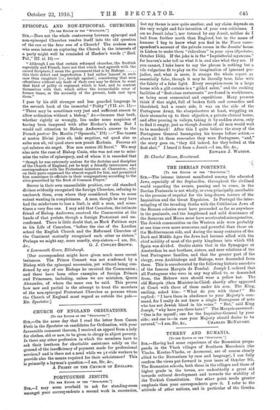EPISCOPAL AND NON-EPISCOPAL CHURCHES.
[TO THE EDITOR OF THE " SPECTATOR."]
SIR,—Does not the whole controversy between episcopal and mon-episcopal Churches resolve itself into the old question of the ease or the bene ease of a Church ? The zealous men 'who seem intent on capturing the Church in the interests of :a party might well be reminded of Hooker's words (" Eccl. Pol.," III. xi. 16) :— " Although I see that certain reformed churches, the Scottish especially and French, have not that which best agreeth with the sacred Scripture, I mean the government that is by Bishops this their defect and imperfection I had rather lament in such case than exagitate [i.e., inveigh against], considering that men oftentimes without any fault of their own may be driven to want that kind of polity or regiment which is best, and to content themselves with that, which either the irremediable error of former times, or the necessity of the present, hath cast upon -them."
I pass by his still stronger and less guarded language in the seventh book of the immortal " Polity " (VII. xiv. 11)- "` There may be sometimes very just and sufficient reason to allow ordination without a bishop," &c.—because that book, whether rightly or wrongly, lies under some suspicion of having been tampered with after Hooker's death. But I would call attention to Bishop Andrewes's answer to the French pasteur Du Moulin (" Opuscula," 191) :—" Nee tamen si nostra Divini juris sit, inde sequitur, vel quod sine ea Remus non sit, vel quod stare non possit Ecclesia. Ferreus sit qui salutem eis neget. Nos non sumus illi fermi." We may also note the case of Bishop Cosin, who was not one to mini- mise the value of episcopacy, and of whom it is recorded that " though he was extremely zealous for the doctrine and discipline of the Church of England, yet he kept a friendly intercourse and -.correspondence with the Protestant ministers at Charenton ; who en their parts expressed the utmost regard for him, and permitted Jahn sometimes to officiate in their congregations according to the rites prescribed by the Book of Common Prayer."
Secure in their own unassailable position, our old standard divines evidently recognised the foreign Churches, refusing to unchurch them, even where they considered them to some extent wanting in completeness. A man, though he may have bad the misfortune to lose a limb, is still a man, and some- times a very fine one. I may add that Casaubon, the intimate friend of Bishop Andrewes, received the Communion at the bands of that prelate, though a foreign Protestant and un- confirmed. There is little doubt that, as Mark Pattison says in his Life of Casaubon, " before the rise of the Laudian school the English Church and the Reformed Churches of the Continent mutually recognised each other as sisters." Perhaps we might say, more exactly, step-sisters.—I am, Sir, G. J. COWLEY-BROWN.
6 Learmonth Grove, Edinburgh.
[Our correspondent might have given much more recent instances. The Prince Consort was not emfirmed by a Bishop with the episcopal succession, yet without being con- firmed by any of our Bishops he received the Communion ; and there have been other examples of foreign Princes and Princesses, including, unless we are mistaken, Queen Alexandra, of whom the same can be said. This proves bow new and partial is the attempt to treat the members
, the non-episcopal Protestant Churches as persons whom the Church of England must regard as outside the pale.— ED. Spectator.]














































 Previous page
Previous page